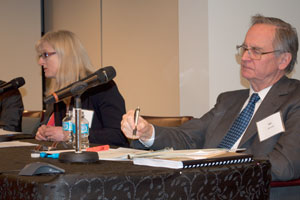Trial judges, not law societies, are in the best position to regulate lawyers’ conduct in the courtroom, according to a panel of legal professionals who participated in a recent discussion on civility.

“In the hothouse of a trial, particularly when you have a vicious battle going on . . . it is extremely difficult for somebody to come after the event and pick it apart and say, ‘Well, you really shouldn’t have said that,’” said former Supreme Court justice Ian Binnie.
Speaking at a Dec. 6 event on civility in the midst of disciplinary proceedings against Toronto lawyer Joe Groia, Binnie said only the people in a courtroom, and in particular the judge, can control lawyers’ conduct and deem it inappropriate.
“A judge is running a trial in order to achieve a disposition in the case,” he said. “And if the conduct of lawyers is getting in the way of achieving that, then it’s time to do something about it.
“And if the judge loses control of the courtroom, it seems to me the problem is we’re not getting the right judges.”
Earlier this year, a Law Society of Upper Canada hearing panel found Groia guilty of misconduct in relation to proceedings against his client, former Bre-X Minerals Ltd. vice chairman John Felderhof, several years back. A hearing panel found Groia “communicated with the prosecution in a manner that was intended to be provocative, was in effect offensive and inconsistent with the proper tone of professional communication.”
The law society also wants Groia to pay $250,000 in costs stemming from the case. Supporters of Groia organized the panel discussion, held at Heenan Blaikie LLP in Toronto, to raise funds to help defray a portion of his legal fees. He’s awaiting the law society’s decision on punishment following the earlier finding of misconduct.
Panellist David Humphrey, partner at Greenspan Humphrey Lavine in Toronto, noted the nuances of what people say in court don’t always come out in writing. “What’s happening in court has to be gauged by someone who’s there, not by someone who later reads a transcription,” he said.
Humphrey said sarcasm, one of the things the law society took issue with when assessing Groia’s conduct during the Bre-X trial, is an example of speech that should be “addressed live.” In his view, the law society has a role to play only when a judge has clearly failed to intervene in blatant misbehaviour.
For Alice Woolley, a law professor and author of
Understanding Lawyers’ Ethics in Canada, the downsides of regulating civility in the ways law societies have applied it in Groia’s case and the matter involving lawyer Gerry Laarakker in British Columbia far outweigh the benefits.
“The belief that you can have appropriate zealous representation and also punish lawyers when they don’t say things in the right way is naive and foolish,” she said.
“A lawyer who is rational and self-interested and reads the Groia decision and reads the Laarakker decision will, if continuing to act rationally and in self-interest, decline to take on the sort of cases both Joe took on and Gerry took on,” Woolley added. “And if they do take on those cases, they will not provide the client with a representation to which they are entitled.”
Lawyers may not always act perfectly, Wolley added, but punishing them for imperfection is “a fruitless quest for something that’s better but may well be unattainable.”
According to Binnie, law societies have incorrectly accepted the notion that lawyers have become more irreverent.
“There is a sense that somehow there was a golden age when everybody was agreeable to one another and we have somehow fallen from this higher state into the incivility quagmire,” he said.
“That was not my experience.”
In Woolley’s view, “law societies are legislating a higher standard of insult” for lawyers. At the same time, she said regulators can be selective in who they prosecute. “If you look at the civility cases, you do not see lawyers from government, you do not see lawyers from the large commercial law firms, you do not see lawyers from the more frankly powerful aspects of the profession.”
The fact that civility is subjective and law societies haven’t specified what constitutes misconduct in that area is even more unsettling, panellists argued. “To have a system that I have to live with as a trial lawyer that tells me I can be found after the fact to have been uncivil without any criteria, guidance” is troubling, said Toronto lawyer Thomas Heintzman.
Even if lawyers are aware law societies can use what they say in court against them later on, it would be unethical to start defending themselves during a trial when their duty is to their client, said Woolley.
In fact, she said there’s jurisprudence in Alberta that forbids lawyers from being a party to a case unless their intervention is necessary for the court’s decision.
For related content, see "Groia defends 'forceful advocacy.'"

 “In the hothouse of a trial, particularly when you have a vicious battle going on . . . it is extremely difficult for somebody to come after the event and pick it apart and say, ‘Well, you really shouldn’t have said that,’” said former Supreme Court justice Ian Binnie.
“In the hothouse of a trial, particularly when you have a vicious battle going on . . . it is extremely difficult for somebody to come after the event and pick it apart and say, ‘Well, you really shouldn’t have said that,’” said former Supreme Court justice Ian Binnie.